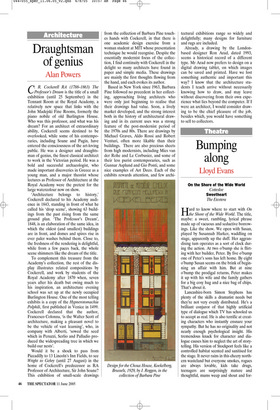Bumping along
Lloyd Evans
On the Shore of the Wide World Cottesloe Sweetheart The Etcetera Hard to know where to start with On the Shore of the Wide World. The title, maybe: a sweet, rambling, lyrical phrase made up of vacuous and seductive borrowings. Like the show. We open with Susan, played by Susannah Harker, waddling on stage, apparently up the duff. Her aggrandising tum operates as a sort of clock during the action. At two o’bump she is flirting with her builder, Peter. By five o’bump one of Peter’s sons has left home. By eight o’bump Susan seems on the brink of beginning an affair with him. But at nine o’bump the prodigal returns, Peter makes it up with his wife and the family gathers for a big cosy hug and a nice bag of chips. That’s about it.
Lancashire-born Simon Stephens has plenty of the skills a dramatist needs but they’re not very evenly distributed. He’s a brilliant conjuror of that highly artificial type of dialogue which TV has schooled us to accept as real. He is also terrific at creating characters who instantly ensnare your sympathy. But he has no originality and not nearly enough psychological insight. His tremendous knack for character and dialogue causes him to neglect the art of storytelling. His version of Stockport feels like a controlled habitat scented and sanitised for the stage. It never rains in this cheery northern wasteland but everyone smokes, rogues are always lovable, kids take drugs, teenagers are surprisingly mature and thoughtful, mums weep and shout and for give, dads get angry for all the right reasons, grandparents have hearts of gold and posh birds are unreachably sexy. That’s about the size of it. When he deploys a big plot-device Stephens hasn’t the talent, or the sense, to keep it concealed. Early on, he kills off a male character simply to put pressure on the other family members and to lend substance to what would otherwise be a rather weightless soap.
A sort of sameyness creeps into everything. The characters evolve along predictable lines, the enchantment of the dialogue fades, and the quick-fire scenes display the same underlying shapes and rhythms. A show that starts off a trifle boring ends up a boring trifle. A great hindrance is the design. Staging a show in the round effectively means making the audience part of the scenery. You can’t concentrate on actors pretending to be real people when you can see, just behind their heads, real people pretending to be interested. It’s too distracting. My guess is that this northern hit will flop in the soft south. A shame. There are some gripping performances, in particular from Matt Smith as the nervy ducker-and-diver Paul. I wanted lots more of his mesmerisingly sleazy rhetoric but the writer got bored with the character and shoved him into a coma. Bizarre.
The Cottesloe’s programme notes deserve a special mention for outstanding achievement in the field of illiterate bombast. The writer’s technique is described thus: ‘There is a deliberate artlessness about the organisation of the sentences that, while it cannot wholly escape the rhetoric tangles of language, gestures beyond them in a manner that compels emotionally and theatrically.’ Squillions in subsidy and they can’t write English. But why moan? It’s like watching the au pair burn down the garden shed. You paid for it. You might as well enjoy it.
In Camden, the Etcetera is one of those lovely compact pub theatres that’s unjustly neglected. A young bunch of actors, with the terrible name ‘H in the Title’, have revived a play by Nick Grosso. Remember him? Ten years ago he was flavour of the month at the Royal Court. But his clever, brittle dialogue lends itself better to films than to the stage and his most recent show at Edinburgh was so poor I couldn’t even be bothered to take a swing at it. Sweetheart is from the midNineties. It’s a bleak, lightweight tale of infidelity set in Kentish Town. Grosso’s slick and competitive teenage chatter is spot-on but he goes too easily for laughs by making his characters excessively dimwitted. Only a subnormal adult, discussing law, would fail to know what a ‘test case’ is. At a push, this might have made a Britflick. To revive it now seems a perverse indulgence. The production is sharp and energetic, and this talented young group might think about choosing a meatier script in future. And a new name, a label that the average person can read without squinting till they start to dribble. H in the Title. That has to go.



















































 Previous page
Previous page